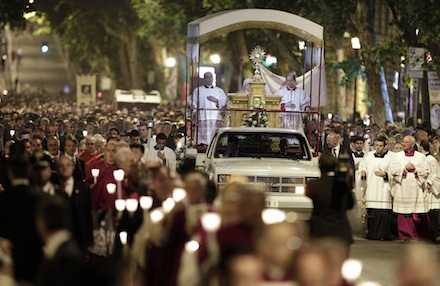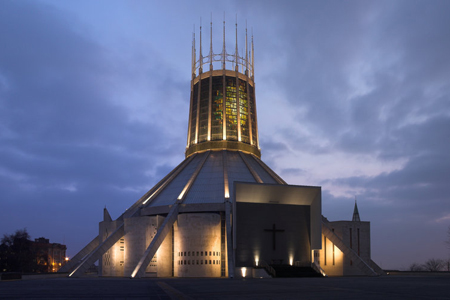Maundy Thursday is the day of the Eucharist and the day of the Priesthood. At our Mass this evening I preached on the Eucharistic Face of Jesus - I'm taking the Holy Face as the theme of my Triduum homilies. I was asked to put the homily on my blog, I usually don't, but I agreed. So here is the text of my reflections this evening; it might be of use to some of you.
Homily for Maundy Thursday 2015
The Holy Face of Jesus I: The Eucharistic Face of Jesus
In a few weeks’ time the famous Shroud of Turin will be exposed in an Extraordinary Solemn Exposition to celebrate the bicentenary of the birth of St John Bosco. Millions will come from around the world to see it. It is a relic that has captured the attention of generations and for many it is intriguing not only because of its age, the seemingly miraculous nature of its composition as an image, but also because it may well reveal the very Face of Jesus himself. It is a relic associated with these days of the Triduum because in it we are confronted us with the reality of the Lord’s passion, death and resurrection. Over these days of the Triduum, in my homilies, I would like to take as our focus the Holy Face of Jesus not only to help us enter these days, and the forthcoming Exposition of the Shroud, but also to help us grow in our relationship with the Lord who became man so we could look upon him and be fulfilled in that desire to see the Face of God.
In his last encyclical, Ecclesia de Eucharistia, the Church and the Eucharist, Pope St John Paul II speaks of the Eucharistic Face of Jesus. This last encyclical, written for Holy Thursday 2003, was prompted by his visit to the Upper Room in Jerusalem in 2000, to the place where the first Mass, the Last Supper, was celebrated. He says in the letter, “I cannot let this Holy Thursday 2003 pass without halting before the “Eucharistic face” of Christ and pointing out with new force to the Church the centrality of the Eucharist”. Tonight as we celebrate that first Mass and ponder the mysteries of the Passion, death and resurrection of the Lord we too must halt before his Eucharistic Face to contemplate, to pray and to enter more deeply into his life, for there we find our own lives. On this Holy Night, we also recognize the centrality of the Eucharist, its venerable nature, and also understand that in it the Face of Jesus Christ is revealed.
Why did Jesus give us the Eucharist? As a memorial, as he says himself: but as a memorial of what? A memorial of his suffering, death and resurrection. The Last Supper was to be understood in the context of the Passover – it was a Seder meal, but of a new Passover, the Passover which would take place the next day when the Lamb of God, Jesus himself would be sacrificed for the people, when his blood would be daubed on wood and the angel of the Lord would pass over the sinful nations and gather the blood of Christ as the expiation for our sins. The Eucharist is that sacrifice which continues in the Church to this day each time Holy Mass is offered. Each time we gather for Mass, we enter that sacrifice and its fruits are given to us to eat, its graces are poured over us. The Church is nourished by the Eucharist, she truly becomes the Church in the Eucharist.
The Eucharistic banquet is one in which we are fed by his own body and blood, with his own life to give us life, with his grace so we can live as his people. The sacramental grace we receive in the Eucharist is one which nourishes our souls and makes us strong, strong to live the Gospel, to excel, to become heroic in the practice of virtue, to face the challenges, trials and sufferings of life. The heart that is open to this will derive great benefit, many blessings and divine strength from the Eucharist. They will no longer complain about not being able to live the Gospel, meet its standards, but like any athlete will rise to the challenge and triumph.
In the Eucharist Jesus also fulfills his promise to stay with us even to the end of time. Present in our tabernacles, he is here for us, he calls out to us, invites us in to is company, and in his company we will never be alone.
And then in the Eucharist we receive the vision of the Face of Jesus. In faith, when we gaze on the Host, but even better still when we receive him in Holy Communion, we are allowed to see his Face – not with the eyes of the body, but with the eyes of the soul. To the soul that is open, living the way of the Lord, to the humble soul that Face is revealed. In his life many saw Jesus, they saw his Face, but to them he was just another man, indeed a man they came to hate. But his disciples, those who believed in him, they looked on his Face and saw the face of God. As Jesus himself said to St Philip: “to see me is to see the Father”. Likewise to some the Eucharistic is just bread, taken, eaten, forgotten. But to those who believe – who know the truth, it is the Lord, and when he enters in Holy Communion, they are filled with his presence, and their souls can see his Face, they contemplate his features, they look upon him as he looks upon them.
The Holy Face of Jesus is revealed in the Eucharist and he intended this: that those who worship him in that holy sacrament may rejoice in this vision that is waiting for them. In giving us the Eucharist, Jesus offers us that vision and it is only the blindness our hearts impose on our souls that prevents us from seeing him. This vision is offered to console us, to strengthen us, and like the lovers who gaze into each other’s eyes we are to do the same – to look on him and fall deeply in love with him. Our encounter with Jesus in the Eucharist is to be the meeting of lovers, where we ponder the beauty of his Face, the majesty of his body offered for us, the glory of his divinity.
On this Holy Thursday we enter into the events of that night when Jesus offered the Last Supper, suffering the agony in the garden, was betrayed and arrested and taken from his disciples to begin his passion. Some, and I hope, many of you will spend time at the Altar of Repose tonight and there, I also hope, you will seek to contemplate his Holy Face as you meditate on these events. Jesus himself said to one of his visionaries, Blessed Maria Pierina de Micheli “He who contemplates me, consoles me” – your contemplation of his Holy Face tonight will console the Lord in his agony. But as you receive him in Holy Communion tonight, remember that kiss – the kiss of Judas planted on the Lord’s face, the ultimate symbol of betrayal. In your Communion, in your contemplation, kiss him too, but let your kiss be one of veneration and adoration, to console rather than betray, and make that kiss a sign of your determination to love him more, as we all should.
Tonight, the veil is lifted, the Eucharistic Face of Jesus is revealed, come us let us worship, let us gaze on him and console him.










